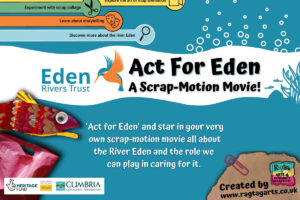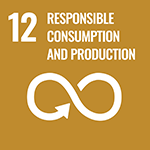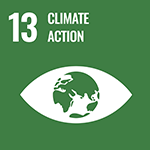![]()
Ditch the disposables
Why?
Did you know that the UK uses 13 billion plastic bottles each year and that plastic bottles make up 33% of all plastic pollution in the sea? Wow. That’s a lot of plastic being thrown away, often after just one use.
As well as clogging up waste disposal sites; bottles, coffee cups, crisp packets, ready meal and takeaway trays find their way into our rivers and then into the sea. Along the way they harm wildlife, break up into microplastics that animals eat instead of nourishing food, and turn our riverbanks into rubbish tips.
This is a problem close to home and our hearts. A recent study showed that there were 29.5 pieces of microplastics found per litre of water in Ullswater (Bangor University and Friends of the Earth 2019).
Whilst out cleaning up riverbanks with schoolchildren in 2019, over 68% of litter we picked up was found to be disposable plastic such as food wrappers, plastic bottles and plastic bags. We even found a crisp packet in pristine condition from 1992! This stuff just doesn’t go away.
The good news is that you CAN make a difference, without missing out on your daily treats.
Where do I start?
Well, by just reducing the amount of disposable plastic bottles, cups or takeaway trays that you use each week by ONE will make a difference – that’s already 52 fewer pieces of plastic a year that will need to be recycled or disposed of!
But we bet that when you start on the ‘ditch the disposables’ journey you’ll find it feels so good and can save you so much money, it’s almost impossible to stop the swap!
You have the power to ditch the disposables.
Scroll down for some ideas of what you can do:
You can do it
Here's how

Reduce your use of plastics
It takes lots of water, energy and oil to make plastic so save natural resources by reducing your use of disposable plastics if you can. If you can’t reduce, then reuse or recycle (but not all plastics can be recycled – check the label for details).
Take a reusable bottle or cup with you
You’re less like to accidentally drop or lose your own bottle or cup - and it’ll save you lots of money too! Don’t be afraid to ask for your reusable cup to be filled at your favourite coffee shop…and see if you can get a discount!
Drinking water refill scheme in Penrith: https://www.penrithact.org.uk/refill
Swap your snacks
Re-fill shops and stations are springing up all over the place allowing you to reuse packaging by re-filling it. if it’s all new to you, start small and build up to more as your confidence grows.
In our area, we're lucky to have a ‘zero waste’ shop in Penrith called Another Weigh. From washing up liquid to pasta, beans to cereals you just bring your container, fill it up and pay by weight … which could also be good for your wallet!
Cover up again ... and again
Swap single-use disposable face coverings for washable re-usable ones, if you can.
The official guidance for the general public in England is to wear a reusable, washable one where possible. They all contain plastics, so don’t rot down and animals have already been found entangled.
They cannot be recycled, so need disposing of in a waste bin. If you’re feeling creative you can make your own – turn it into a wet-weather indoor activity!
Be choosy about plastic packaging
Take a look in your fridge, freezer and kitchen cupboards and you’ll see a lot of your food is wrapped or packaged in plastic, all of which is designed to be single-use and much of which is difficult or impossible to recycle.
The black plastic often used for microwaveable meals and meats is difficult for recycling plants to scan correctly and therefore recycle – even if it says it can be recycled, it is unlikely to be. Some supermarkets, such as ASDA are starting to use other recyclable materials for ready meals, is your local one? If not, ask them why not!
Ready-made pizzas are often presented on polystyrene boards that cannot be recycled – choose ones on cardboard instead.
Soft plastics such as plastic carrier bags and bread wrappers can be recycled in many supermarkets (such as Morrisons and the Co-op). Look for the special bins.
Cook up a storm
Can you swap one or more ready-meal a week for a home-cooked meal?
Try cooking in bulk, when you make a home-cooked meal, pop some in the freezer for later in the week and bingo! – you have a ready meal at a fraction of the cost and reduced its environmental impact as well.
Act for Eden - create a stop-motion movie

We’ve joined forces with our friends at Ragtag Arts for a fun activity that can be done at home. We’re calling on kids everywhere to Act for Eden and make a stop-motion film about the river, the wildlife that lives there … and the perils they face from humans!
Step-by-step videos and templates can be found at Act for Eden – make a scrap-motion movie
![]()
Inspired?
Join the growing number of people who are making a promise to Act for Eden and make yours today to ditch the disposables!
![]()
I promise to
Ditch the disposables
and stop using single-use plastics
U.N. Sustainable Development Goals


The action that you’re taking as part of Act for Eden will not just make a difference in your local river and community, it will help transform the world!
This promise has been carefully chosen to meet one or more of the Sustainable Development Goals (SDGs). These are a set of 17 goals set out by the United Nations to focus efforts around the world in order to “achieve a better and more sustainable future for all.” (UN SDG website)
Although major actions are needed by governments, cities and local authorities, it starts with each and every one of us. By keeping your promise to Act for Eden, you are already living and working more sustainably - which is great news for our planet.
You are also part of a growing community of like-minded people who together, are leading by example and generating a force for change, able to push those in authority to make the transformations required. All this just by ditching the disposables!
